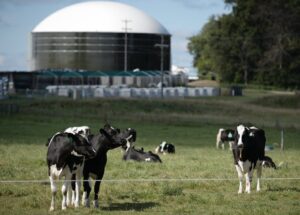“Ireland’s drive to reach national biomethane decarbonisation targets through the construction of 150-200 large scale AD plants”

RGFI has worked with KPMG since 2019, producing An Integrated Business Case for Biomethane in Ireland which laid the foundation for government confidence in the value and feasibility of biomethane production to decarbonise industry thermal processes.
KPMG has also supported RGFI’s work on agri-food industry collaboration through Project Clover. This work and the united voice provided by RGFI for the whole biomethane industry has brought biomethane to the fore as a central part of Ireland’s decarbonisation effort, as well as supporting the circular bioeconomy and adding to Ireland’s future energy security.
Ireland’s National Biomethane Strategy is being finalised by the Department of Agriculture, Food and the Marine, the Department of Environment, Climate and Communications, supported by KPMG.
The national target of 5.7TWh biomethane production by 2030 will require the construction of 150-200 large scale AD biomethane plants. Co-products of digestate fertiliser and biogenic CO2 have a strong role to play in valorisation and demand is high. However clear definitions and certification are urgently needed, as well as on-site recovery and separation facilities.
A concerted, collaborative effort is required, across government and industry to meet the target within the timeframe and to establish the industry support for the Circular Economy Action Programme (CEAP).


















